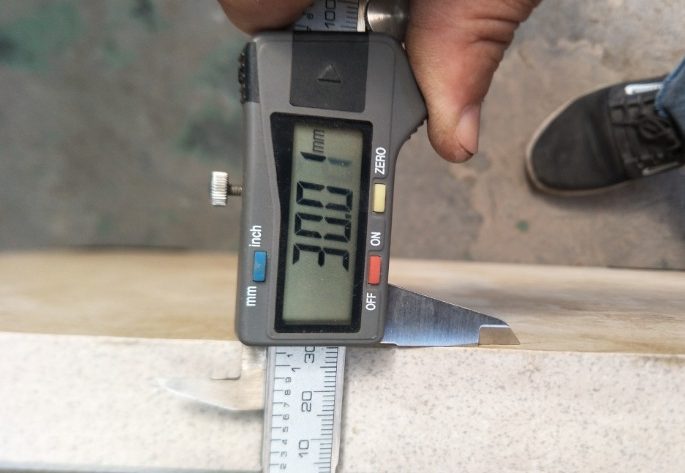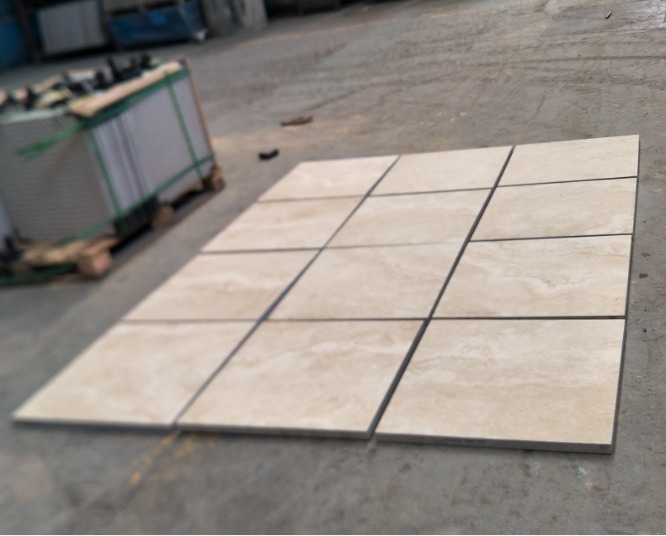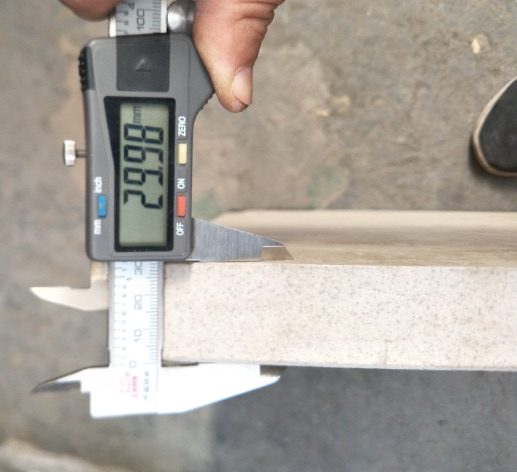۳۰mm Thick Ceramic Tiles: Specifications and Applications
30mm thick ceramic tiles have gained significant attention in recent years as a durable and resistant building material. Due to their considerable thickness, these tiles possess unique properties that make them suitable for specific applications. This article will explore the specifications and applications of 30mm thick ceramic tiles.
Specifications of 30mm Thick Ceramic Tiles:

High Thickness: The most prominent feature of these tiles is their 30mm thickness, which enhances their resistance to impact, pressure, and abrasion.
High Density: Due to their greater thickness, these tiles also have a higher density, resulting in a heavier weight and greater resistance to deformation.
Low Water Absorption: Thick ceramic tiles typically have very low water absorption, increasing their resistance to moisture and water penetration.
Chemical Resistance: These tiles are resistant to many chemicals and are used in industrial and laboratory environments.
Heat Resistance: Thick ceramic tiles have high heat tolerance and are suitable for areas exposed to direct heat, such as kitchens and fireplaces.
Thermal and Acoustic Insulation: Due to their thickness, these tiles provide good thermal and acoustic insulation, preventing heat and sound transmission.
Applications of 30mm Thick Ceramic Tiles:
Industrial Flooring: Due to their high resistance to abrasion and impact, 30mm thick ceramic tiles are suitable for flooring in factories, warehouses, and heavy-duty industrial environments.
Parking Lot Flooring: In parking lots where heavy vehicle traffic is expected, the use of these tiles is recommended due to their high resistance.
Commercial Center Flooring: In high-traffic commercial centers, the use of thick tiles is a suitable choice due to their resistance to abrasion and heavy foot traffic.
Pool and Sauna Flooring: Due to their resistance to moisture and chemicals, these tiles are ideal for pool and sauna flooring.
Building Facade Cladding: In some cases, 30mm thick ceramic tiles are used for building facade cladding, giving buildings a modern and durable appearance.
Industrial Sinks: Due to their resistance to chemicals and heat, thick ceramic tiles are suitable for the construction of industrial sinks.
Advantages:
High Durability and Longevity: Due to their high resistance to abrasion, impact, and environmental factors, these ceramic tiles have a very long lifespan.
Beauty and Variety of Designs: Thick ceramic tiles are produced in a variety of designs and colors, and can add beauty and elegance to any space.
Easy to Clean: The smooth, non-porous surface of thick ceramic tiles makes them very easy to clean.
Stain Resistance: Thick ceramic tiles are stain-resistant and easy to clean.
Disadvantage:
Heavy Weight: Due to their thickness and density, these ceramic tiles are heavy, making them more difficult to transport and install.
High Cost: Due to their special properties and complex production process, thick ceramic tiles are more expensive than other types of ceramic tiles.

Key Factors in Choosing 20mm and 30mm Thick Ceramic Tiles
Selecting the right thickness for ceramic tiles, especially when considering 20mm and 30mm options, is a crucial decision during construction or renovation. This choice is influenced by various factors such as the intended use of the space, environmental conditions, and budget. Let’s
delve into the key factors that impact this decision:
1. Space Usage:
Heavy Traffic Areas: For high-traffic areas like parking lots, factories, and commercial centers, 30mm tiles are more suitable due to their superior resistance to wear and tear.
Residential Spaces: In residential areas like kitchens, bathrooms, and living rooms, 20mm tiles are typically sufficient and lighter in weight.
Outdoor Areas: For outdoor spaces exposed to the elements, 30mm tiles offer better resistance to weather conditions.
2. Environmental Conditions:
Humidity: In humid environments like bathrooms and kitchens, tiles with low water absorption and moisture resistance are preferred.
Heat: For areas exposed to direct heat, such as kitchens, heat-resistant tiles are recommended.
Chemicals: In industrial and laboratory settings exposed to chemicals, chemically resistant tiles are essential.
3. Budget:
Due to their greater thickness and more complex manufacturing process, 30mm tiles usually have a higher price.
The project budget is a significant factor in determining tile thickness.
4. Weight and Dead Load:
30mm tiles, being heavier, increase the dead load on the building.
For buildings with older structures or limited load-bearing capacity, lighter 20mm tiles are recommended.
5. Installation:
Installing 30mm tiles requires more precision and expertise due to their weight.
Proper substrate preparation is crucial for installing thicker tiles.
6. Insulation:
Thicker tiles, due to their increased thickness, offer better thermal and acoustic insulation.
In areas where thermal and acoustic insulation is important, 30mm tiles are a better choice.
7. Interior Design:
Tile thickness can influence the overall interior design.
In some design styles, thicker tiles are preferred for their industrial and modern appearance.

Conclusion:
The choice between 20mm and 30mm tiles depends on various factors and requires a careful evaluation of each project’s specific conditions. Consulting with a ceramic tile expert can greatly assist in making the best choice.
Prioritize high-quality tiles that meet national standards.
Ensure proper substrate preparation for tile installation.
Seal the joints between tiles to prevent water and dirt penetration.
By considering these factors, you can make an informed decision when selecting the appropriate tile thickness for your project.
30mm thick ceramic tiles, due to their unique properties, are a suitable choice for places that require high resistance, durability, and beauty. However, before choosing this type of tile, you should carefully consider its advantages and disadvantages and make the best decision based on your environmental conditions and budget.
قیمت های موجود در سایت تاریخ بروزرسانی آن ها ذکر شده و قیمت نهایی محصولات نمی باشند. لطفا جهت ثبت سفارش و استعلام قیمت بروز با کارشناسان ما در ارتباط باشید.
(035-3357)